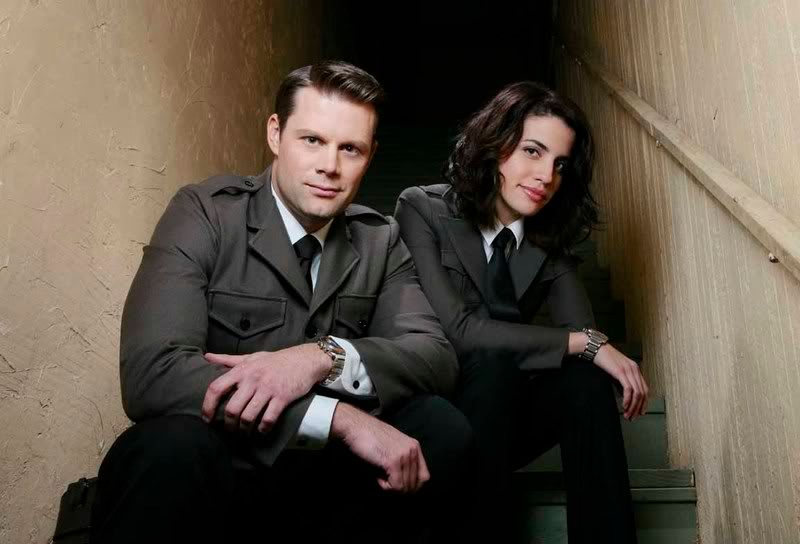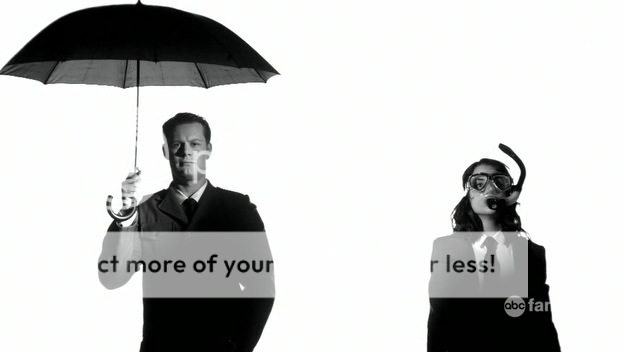This TV review first posted June 10, 2008.
Edited to remove a waffly first paragraph.
"Fighting evil, so you don't have to."
ABC Family's The Middleman seems destined—indeed, designed—to be a cult favourite. Too goofy for the mainstream, it's also hampered by a budget that the most basic of basic cable hour-longs might be ashamed of. But what it has in spades is charm and a lack of preciousness that lifts it above the unoriginal premise and similar, more self-consciously offbeat fare. Enough, at least, to ensure it finds a niche populated by kids looking for a clever actioner that doesn't speak down to them, and older kids adults charmed by pop culture references familiar enough to evoke Buffy and its contemporaries, yet obscure enough to make them feel smart.
Edited to remove a waffly first paragraph.
"Fighting evil, so you don't have to."
ABC Family's The Middleman seems destined—indeed, designed—to be a cult favourite. Too goofy for the mainstream, it's also hampered by a budget that the most basic of basic cable hour-longs might be ashamed of. But what it has in spades is charm and a lack of preciousness that lifts it above the unoriginal premise and similar, more self-consciously offbeat fare. Enough, at least, to ensure it finds a niche populated by kids looking for a clever actioner that doesn't speak down to them, and older kids adults charmed by pop culture references familiar enough to evoke Buffy and its contemporaries, yet obscure enough to make them feel smart.
On paper The Middleman holds little promise: "A young woman is recruited by a secret agency to fight against evil forces." More Men in Black than Buffy, it offers little variation from the age-old trope: a world of aliens and monsters (and super-intelligent, genetically-engineered primates) coexisting alongside the world of men. Sometimes peacefully, other times less so. When someone from the outside discovers this secret world, they must become part of it, or join those who fight or police it. And that's pretty much what we have here. Wendy (Natalie Morales) is a geeky temp secretary who during one posting is attacked by what she describes as a "hentai tentacle monster". The beast is dealt with by an implacable stranger, the eponymous "Middleman" (Matt Keeslar), who fights evil using an array of whizzy gadgets supplied by an unknown power. Impressed by Wendy's poise in unusual circumstances ("95% of people would fill their shorts and be eaten"), he offers her a job as his apprentice/sidekick.

The Middleman doesn't wear its influences on its sleeve so much as have them tattooed on its face. "The Pilot Episode Sanction" is a Frankenstein's Monster of someone else's ideas. But what judicious employment of familiar concepts allows is room for the dialogue and characters to breathe, without having to spend too long explaining the set-up. And while it doesn't subvert the trope entirely, it does undermine it with clever digs at both its own and the genre's preposterousness ("that belonged to my father, who disappeared in mysterious and as-yet-unexplained circumstances") and via the fourth wall-breaking captions.
The dialogue is equally sly, assaulting the viewer with pop culture references and screwball sparring. Morales' delivery is perfect: rapid-fire and deadpan, she's more Garofolo than Gellar, though hotter and geekier than both. Keeslar, channelling Constable Benton Fraser—shit, how good would Paul Gross be in this part?—isn't quite so confident, but his might be the harder role: a former Navy Seal, the character is written as an endearing throwback to a more innocent time, ruthless, intelligent and maybe a little dim—all at the same time. And all the while spouting goshdang-it-to-heck aphorisms (he never swears, except when he does).
The dialogue is equally sly, assaulting the viewer with pop culture references and screwball sparring. Morales' delivery is perfect: rapid-fire and deadpan, she's more Garofolo than Gellar, though hotter and geekier than both. Keeslar, channelling Constable Benton Fraser—shit, how good would Paul Gross be in this part?—isn't quite so confident, but his might be the harder role: a former Navy Seal, the character is written as an endearing throwback to a more innocent time, ruthless, intelligent and maybe a little dim—all at the same time. And all the while spouting goshdang-it-to-heck aphorisms (he never swears, except when he does).
If the show seldom pauses long enough to allow appreciation the more delicious lines, nor does it allow reflection on its weaker moments. In any event, only a few spoil the party: a series of gangster film quotes that not once stray from the obvious (The Godfather, Scarface), and a Planet of the Apes reference which I'm surprised didn't get left on The Simpsons' cutting-room floor where they found it. The pilot also seems to run out of breath halfway through when Wendy's boyfriend appears, a boring dick undeserving of both his screen time and Wendy's forgiveness. But it gets its second wind as it approaches a denouement marred only by the obvious deficiencies in the budget.
So ignore that, throw in a ridiculously human robot with a prickly demeanour, and a black-and-white aside that ends with an image of the Middleman holding an umbrella and Wendy wearing a scuba mask, and you're left with what has the potential to be one of the oddest and smartest shows you'll see this summer.

Notes from the future:
- The second episode isn't very good, but it all picks up from there.
- I'm not sure how I got through this review without mentioning Nu-Who, which in hindsight seems an obvious influence.
- Mark Sheppard shows up in episodes 11 and 12, back when he was being good in stuff.